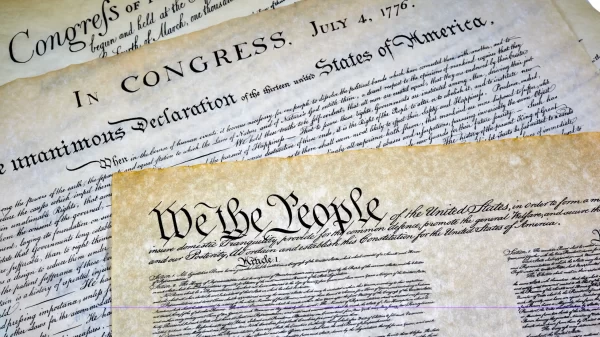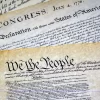By Brandon Moseley
Alabama Political Reporter
A pro-gun Republican dominated State legislature voted to put Amendment 3 on the Alabama ballot, even though the National Rifleman’s Association (NRA) endorsed the pro-gun amendment. As expected, there is some opposition building to adding more gun rights language to the Alabama Constitution. But, rather than coming from National anti-gun groups, the opposition is coming from a small, yet vocal segment of Alabama’s gun rights community who think the new language might weaken the existing gun rights language in Alabama’s 1901 Constitution.
The House Republican Caucus has released a statement promoting amendment three and urging voters to pass it into the state Constitution on November 4.
The Alabama House GOP Caucus wrote on Facebook, “Amendment 3 establishes that the right to bear arms in Alabama is afforded the highest constitutional protections against any potential state or local government infringement on the right to bear arms. It’s also endorsed by the National Rifle Association.”
The House GOP caucus said in a statement, “Amendment 3 makes it explicitly clear in Alabama’s Constitution that under Alabama law, the right of Alabama citizens to bear arms is a fundamental right, entitled to the highest protections of the law. It creates maximum constitutional safeguards against liberal judges and politicians in Washington D.C. and on the local level from trying to enact gun control measures in Alabama. It also provides greater gun rights protections from interference by unconstitutional international treaties or foreign laws.”
The Alabama Republican Caucus wrote that voters should vote for Amendment 3; because: “Amendment 3 establishes that the right to bear arms in Alabama is afforded the highest constitutional protections against any potential state or local government infringement on the right to bear arms. Alabama’s standards would make gun rights in Alabama stronger and more protected than the current standards of the U.S. Supreme Court.”
The GOP State representatives wrote, “Currently, our Alabama Constitution does not contain language clarifying the right to bear arms as a fundamental right. In addition, rulings from the United States Supreme Court and lower federal courts have failed to establish the highest constitutional protections for the right to bear arms – also known as “strict scrutiny.” Amendment 3 ensures that our constitution has the greatest possible protections for your right to bear arms.”
Amendment 3 has been endorsed by gun rights organizations including, the National Rifle Association, the Alabama Gun Rights Association, the Second Amendment Foundation, Gun Owners of America, and the Citizens Committee on the Right to Keep and Bear Arms.
Still many gun rights advocates are wary of the amendment. The Alabama House GOP responded to what they call a, “myth.” The argument of the anti-Amendment 3 people is that it potentially, “Opens the door for future courts or State legislatures, under the sway of leftists, to impose restrictions on Alabamians’ gun rights.”
The House GOP Caucus responds that: “Amendment 3 makes it more not less difficult for future state or local governments or courts to impose restrictions on Alabamians’ gun rights. Amendment 3 ensures that if any liberal-leaning state judge or government body tries to restrict gun rights in the future, those rights are protected by the highest possible constitutional protections – strict scrutiny. Strict scrutiny is a well-established legal term which provides constitutionally recognized fundamental rights with the highest protections of law against any proposed government infringement of that right. Amendment 3 provides greater constitutional protections than what currently exists, making it tougher for a court to approve any future law restricting your right to bear arms.”
The House GOP caucus says it is also a “myth” that: “Amendment 3 takes away the God-given and natural right of self-defense recognized in the existing wording of Section 26 of the Alabama Constitution and transforms it into a mere “fundamental right” which is subject to government restrictions. OR Our right to bear arms for defense is already recognized as a “fundamental” right in our Declaration of Rights in the Alabama Constitution.”
The Republican legislators respond to that argument that: “Fundamental rights are our most sacred rights under the constitution. The language in Section 26 of Alabama’s Constitution only refers to a citizen’s bearing arms as a “right.” Amendment 3 elevates Alabama’s constitutional language regarding the right to bear arms to a fundamental right that is given the highest possible protection under state law. Fundamental rights are provided more protection from government interference than other standard legal “rights.” Although the right to bear arms is one of our sacred rights, the current language of Alabama’s Constitution does not provide the absolute protection that some have argued because the right to bear arms is not defined and does not state what goes beyond simply “bearing arms.” Our state courts have also ruled that Section 2 of the Alabama Constitution gives ultimate authority to the citizens to legally and lawfully remove any provision from the Constitution which they previously put in or ratified, even our Declaration of Rights.”
Another myth that they address is that: “Strict scrutiny is already the standard for interpretation in cases involving gun rights or other fundamental rights.”
The GOP’s response is that: “Different courts have used different levels of scrutiny in cases involving gun rights. Nowhere in federal or state law or case law does it require strict security to be applied to cases involving gun rights. The United States Supreme Court and lower federal courts have failed to establish the highest constitutional protections for the right to bear arms – also known as “strict scrutiny.” As such, many state and lower federal courts have sometimes applied a lower level of protection (i.e., “intermediate scrutiny”) against government infringement. Amendment 3 specifically states that strict scrutiny must be used against a state or local government in cases where the right to bear arms is sought to be restricted.”
The Republican lawmakers addressed another “myth.” That: “The state is not currently permitted to impose any restrictions on your God-given right to self-defense, and Amendment 3 will give the government this authority.”
The Alabama House Republican Caucus responded that it is a “FACT” that, “Federal, State and local governments can and have imposed certain restrictions on gun rights for many years. Federal and State courts have generally agreed that government can impose “reasonable regulations” on the right to bear arms. For example, there is nothing about pistol permits or background checks in our state constitution, but they have been upheld by our courts and other courts around the country as reasonable regulations for the good of the public’s safety. Amendment 3 will make it much more difficult for state and local governments to impose restrictions on Alabamians’ gun rights, and will especially help prevent local governments from enforcing local ordinances that go beyond imposing reasonable regulations on gun rights.”
The House GOP Caucus also said that Amendment 3 will not allow felons to legally carry guns. The Caucus wrote: “Alabama law continues to prohibit felons from legally possessing firearms. The U.S. Supreme Court has consistently upheld bans in state laws against possession of firearms by felons. This is a prime example of a state or local restriction on firearms that would meet the “strict scrutiny” standard under Amendment 3. Louisiana had this same concern when the state passed its “strict scrutiny” constitutional amendment in 2012 and that argument has been laid to rest by the Louisiana Supreme Court. In a unanimous decision earlier this year, the Court held that its law preventing the possession of firearms by convicted felons (Alabama has a similar law) was not affected by their amendment (which was similar to Alabama’s Amendment 3) and that it withstands a strict scrutiny analysis.”
The voters will get to decide this matter on November 4.



















































